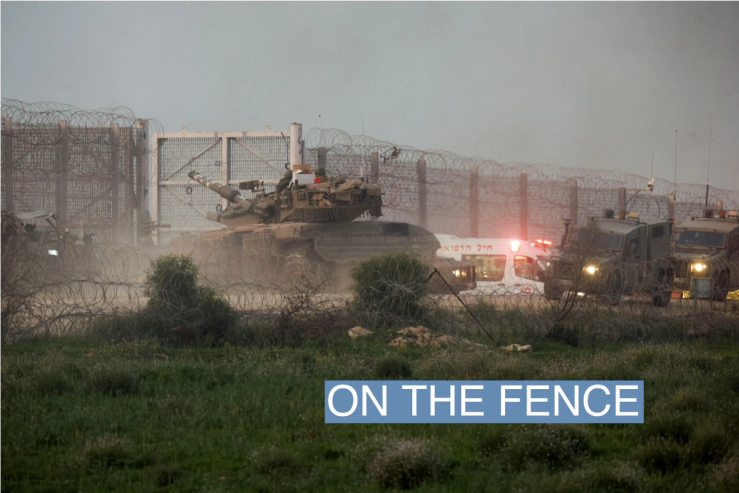The Scoop
Israel’s military is considering building a one- to two-kilometer demilitarized zone, or no man’s land, on the Palestinian side of the Gaza Strip’s border with the Jewish state to prevent a repeat of the militant group Hamas’ October 7 attack on the country.
This security zone, people briefed by the Israel Defense Forces told Semafor, could be mined and include sentry towers along Gaza’s northern and eastern borders with Israel. Some inside the IDF describe a “kill zone,” with anyone approaching the fence from inside Gaza without authorization being at risk of being shot.
“If we want to prevent this [October 7] happening in the future, what we need is a barrier — sort of a no man’s land — a zone in which no one can enter from their side,” Yaakov Amidror, a former national security advisor to Israeli Prime Minister Benjamin Netanyahu, told Semafor. “I think this is the way that we should keep everyone out of reach from the fence.”
Israel is currently entering the fourth month of its war in Gaza. And the Biden administration is pressing Netanyahu’s government to begin winding down its military operations and begin thinking about the status of the Gaza Strip after the fighting, including both who runs the Palestinian territory and who will secure it.
U.S. and Israeli officials say it’s still relatively early in these discussions. But people who have discussed the border issue with the IDF and Israel’s other security services in recent weeks say there’s near-uniform agreement that the Gaza border will need to be dramatically more secure than before October 7. And this includes a security zone on the Palestinian side.
“The Israelis are not giving up an inch [of territory] from their perspective,” said Jonathan Schanzer of the Foundation for Defense of Democracies, a Washington DC think tank that promotes Israel’s security, who recently discussed the demilitarized zone issue with IDF officials. “So that means that anything that is done, in addition to what existed before, will be at the cost of territory on the other side.”
In this article:
Jay’s view
Israeli leaders are pursuing their war against Hamas, not only as a campaign to eliminate the Palestinian organization’s military leadership and infrastructure, but as an operation critical to reestablishing their country’s territorial integrity. Any weakening of Israel’s borders, they believe, is an existential threat to the country’s long-term stability and vitality. But plans to construct a demilitarized zone inside Gaza could place Israel into conflict with the Biden administration and Palestinians who see a different post-war structure.
Netanyahu’s government has been forced to evacuate large populations from the villages and kibbutzim in southern Israel attacked by Hamas on October 7. Israel has also relocated citizens from Israel’s northern border with Lebanon in the face of continued attacks by the Iranian-backed militia, Hezbollah, and reprisals by the IDF. Current and former Israeli officials told Semafor that the conceived security zone inside Gaza will allow southern Israel to be repopulated without any reduction in the Jewish state’s liveable lands.
IDF officials have also told interlocutors that their country’s relationship with Gaza is set to dramatically change after the war. Pre-October 7, Israel supplied electricity and food to the Gaza Strip, and allowed Palestinians from the territory to enter Israel for work. Going ahead, Israel is planning to treat Gaza solely as a security issue and hand over humanitarian and economic matters to the international community and Arab governments.
“The Israelis are saying: We’re going to make this buffer zone, and then we’re going to cut contact,” said Schanzer, FDD’s senior vice president for research. “No more coal or gas. No more providing of electricity or any of that kind of stuff. The idea is that all of this gets transferred over elsewhere.”
The View From Washington
U.S. Secretary of State Antony Blinken has pressed Prime Minister Netanyahu in recent weeks to prepare to allow the Palestinian Authority, which administers much of the West Bank, to resume a leadership role in the Gaza Strip. He also has stressed that Israel must relinquish control of the territory and allow for its repopulation by Palestinian. And he’s called for the resumption of negotiations to establish an independent Palestinian state in the West Bank and Gaza Strip, something Netanyahu said last week that he opposes.
“[Israel] must be a partner of the Palestinian leaders who are willing to lead their people” and live “side by side in peace,” Blinken said earlier this month in Tel Aviv.
President Biden also said that he believed the pathway for two states is still possible even with Netanyahu in power. “Obviously we’re talking to them actively about post-conflict Gaza, and what governance there needs to look like and the importance of an independent Palestinian state for long term security, not just for the Palestinian people, but for the Israeli people as well,” National Security Council spokesman John Kirby said.
Notable
- Israel’s Defense Minister Yoav Gallant said earlier this month that his country wouldn’t maintain a civilian presence inside the Gaza Strip after the war but maintained the right to operate militarily there.


